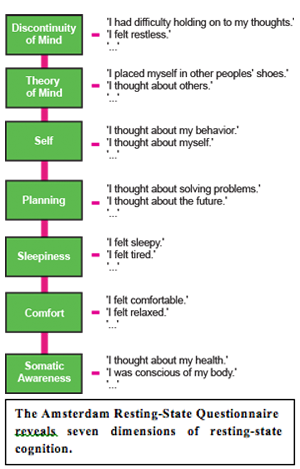
CNCR and NIN researchers publish the "Amsterdam Resting-State Questionnaire".
By quantifying thoughts and feelings, the tool bridges the missing link between conscious experiences and brain activity during rest.
We are all familiar with the vivid experience of thoughts and feelings that have little bearing on the immediate sensory environment. Such mental processes are particularly prominent during wakeful rest, which is a condition widely used by the neuroimaging community. “Ironically, we know little about the neural correlates of cognition during rest, because tools to quantify thoughts and feelings experienced during the scanning session have been lacking” Dr. Klaus Linkenkaer-Hansen explains.
Thus, to shed light on the functional significance of resting-state brain activity patterns – and more generally to map cognition during rest-like states–researchers from the CNCR (Neuroscience Campus Amsterdam) and the Netherlands Institute for Neuroscience, developed the Amsterdam Resting-State Questionnaire (ARSQ).
 “Having studied spontaneous brain activity for 15 years, it’s a dream come true to develop a tool to investigate cognition emerging from this activity” said Klaus Linkenkaer-Hansen, team leader of Neuronal Oscillations and Cognition at the CNCR.
“Having studied spontaneous brain activity for 15 years, it’s a dream come true to develop a tool to investigate cognition emerging from this activity” said Klaus Linkenkaer-Hansen, team leader of Neuronal Oscillations and Cognition at the CNCR.
“Colleagues from many departments have helped in various phases of the project. This makes it a truly interdisciplinary NCA product. In addition, the close collaboration with the group of Prof. Eus van Someren at the NIN has been critical to our success. For example by implementing the ARSQ in the online assessment battery of the Netherlands Sleep Registry, more than 1000 people provided data on their thoughts and feelings during a 5 minutes eyes-closed rest session performed in their home. With this extensive data set we revealed multiple phenotypes of resting-state cognition, using factor analytical methods. Now we can pursue the exciting challenges of mapping their neural correlates and the impact of disease on endogenous experiences‚.
The publication is also a major credit to Alexander Diaz, for whom this is a main chapter in his PhD thesis. The full paper is available as open access here:
http://www.frontiersin.org/Human_Neuroscience/10.3389/fnhum.2013.00446/abstract
If you wish to implement the ARSQ in your research, we can support this in various ways. Please contact Dr. Klaus Linkenkaer-Hansen.